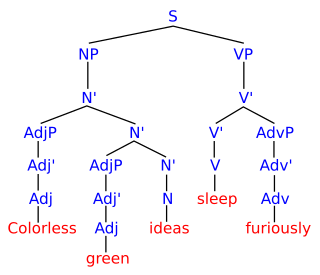Derivation may refer to:
Derivation may refer to:

In logic, mathematics, computer science, and linguistics, a formal language consists of words whose letters are taken from an alphabet and are well-formed according to a specific set of rules.
The following outline is provided as an overview and topical guide to linguistics:
In linguistics, syntax is the study of how words and morphemes combine to form larger units such as phrases and sentences. Central concerns of syntax include word order, grammatical relations, hierarchical sentence structure (constituency), agreement, the nature of crosslinguistic variation, and the relationship between form and meaning (semantics). There are numerous approaches to syntax that differ in their central assumptions and goals.
Period may refer to:

A parse tree or parsing tree or derivation tree or concrete syntax tree is an ordered, rooted tree that represents the syntactic structure of a string according to some context-free grammar. The term parse tree itself is used primarily in computational linguistics; in theoretical syntax, the term syntax tree is more common.
Formal, formality, informal or informality imply the complying with, or not complying with, some set of requirements. They may refer to:
Deep structure and surface structure are concepts used in linguistics, specifically in the study of syntax in the Chomskyan tradition of transformational generative grammar.
Parsing, syntax analysis, or syntactic analysis is the process of analyzing a string of symbols, either in natural language, computer languages or data structures, conforming to the rules of a formal grammar. The term parsing comes from Latin pars (orationis), meaning part.

Generative grammar, or generativism, is a linguistic theory that regards linguistics as the study of a hypothesised innate grammatical structure. It is a biological or biologistic modification of earlier structuralist theories of linguistics, deriving ultimately from glossematics. Generative grammar considers grammar as a system of rules that generates exactly those combinations of words that form grammatical sentences in a given language. It is a system of explicit rules that may apply repeatedly to generate an indefinite number of sentences which can be as long as one wants them to be. The difference from structural and functional models is that the object is base-generated within the verb phrase in generative grammar. This purportedly cognitive structure is thought of as being a part of a universal grammar, a syntactic structure which is caused by a genetic mutation in humans.
Catena or catenae (plural) may refer to:
Tree diagram may refer to:
The derivative of a function is the rate of change of the function's output relative to its input value.
The term phrase structure grammar was originally introduced by Noam Chomsky as the term for grammar studied previously by Emil Post and Axel Thue. Some authors, however, reserve the term for more restricted grammars in the Chomsky hierarchy: context-sensitive grammars or context-free grammars. In a broader sense, phrase structure grammars are also known as constituency grammars. The defining trait of phrase structure grammars is thus their adherence to the constituency relation, as opposed to the dependency relation of dependency grammars.
Stemma may refer to:
Minimalism is a movement in visual arts, music, and other media that began in post–World War II Western art.
Syntax tree may refer to:
A tree is a perennial woody plant.
Interpretation may refer to:
In mathematics and other formal sciences, first-order or first order most often means either:
Order, ORDER or Orders may refer to: